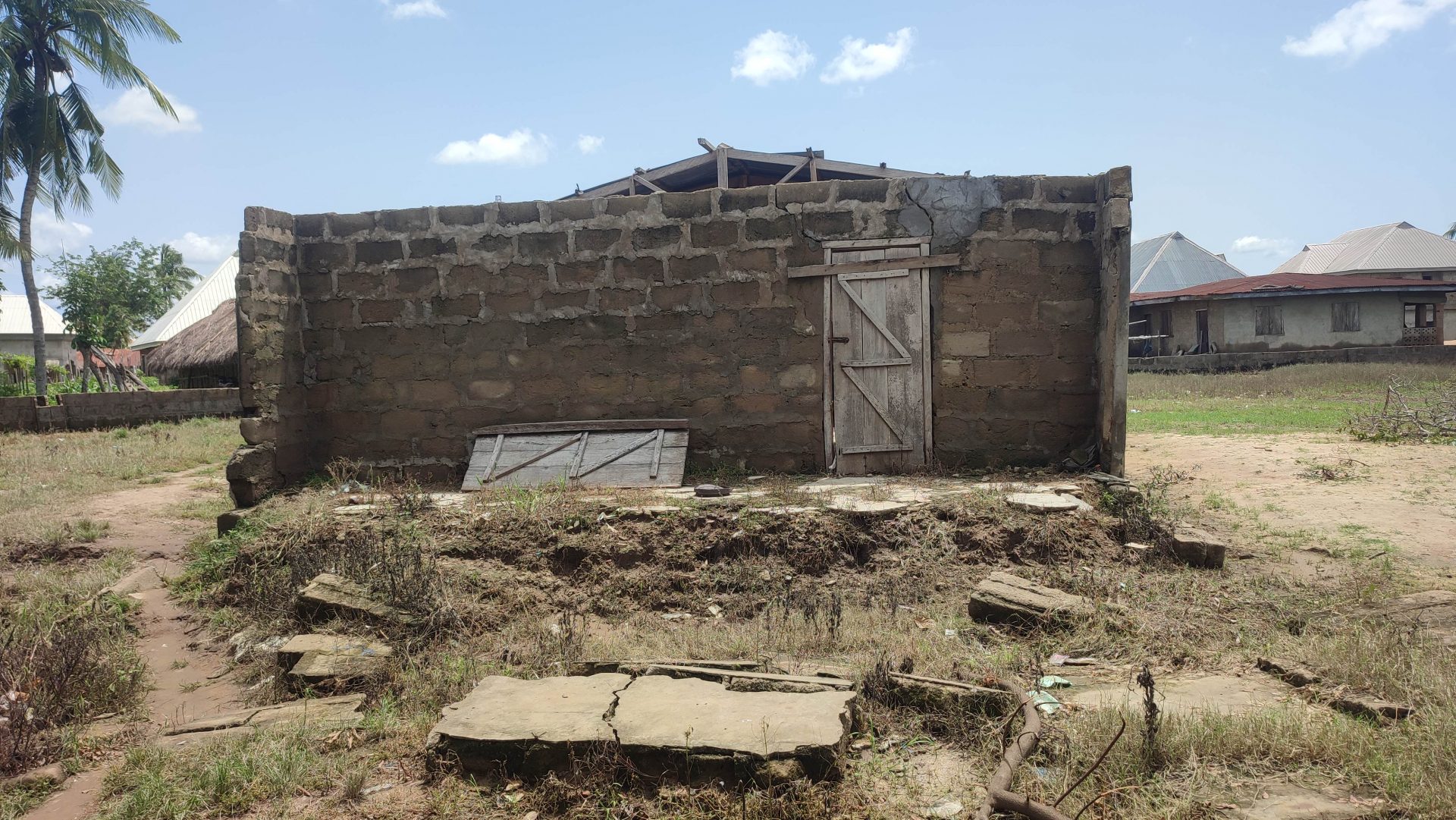In this report, Arinze Chijioke takes a look at the devastating impacts of the 2022 flooding in Kogi State and how the state government is not showing a clear commitment to forestalling a recurrence. This is the first of a three-part series on the 2022 flooding in Kogi, Delta and Anambra States.
Iko Sunday and his family were harvesting Rice on their farmland in Onyedega, one of the communities in Ibaji local government in Kogi State when the flood came last September. He had planted eight basins, hoping for a bountiful harvest.
“We managed to harvest only one basin before the flood took over our farmland, destroying everything, “recalled Sunday. “Me and my family and four children- could not return home because everywhere had been submerged,”.
From their farm, they escaped to a mountain close to the community where he constructed a makeshift tent with bamboo and palm trees. There, they spent over two months, other households also ran up to the mountain. It was a safe haven.
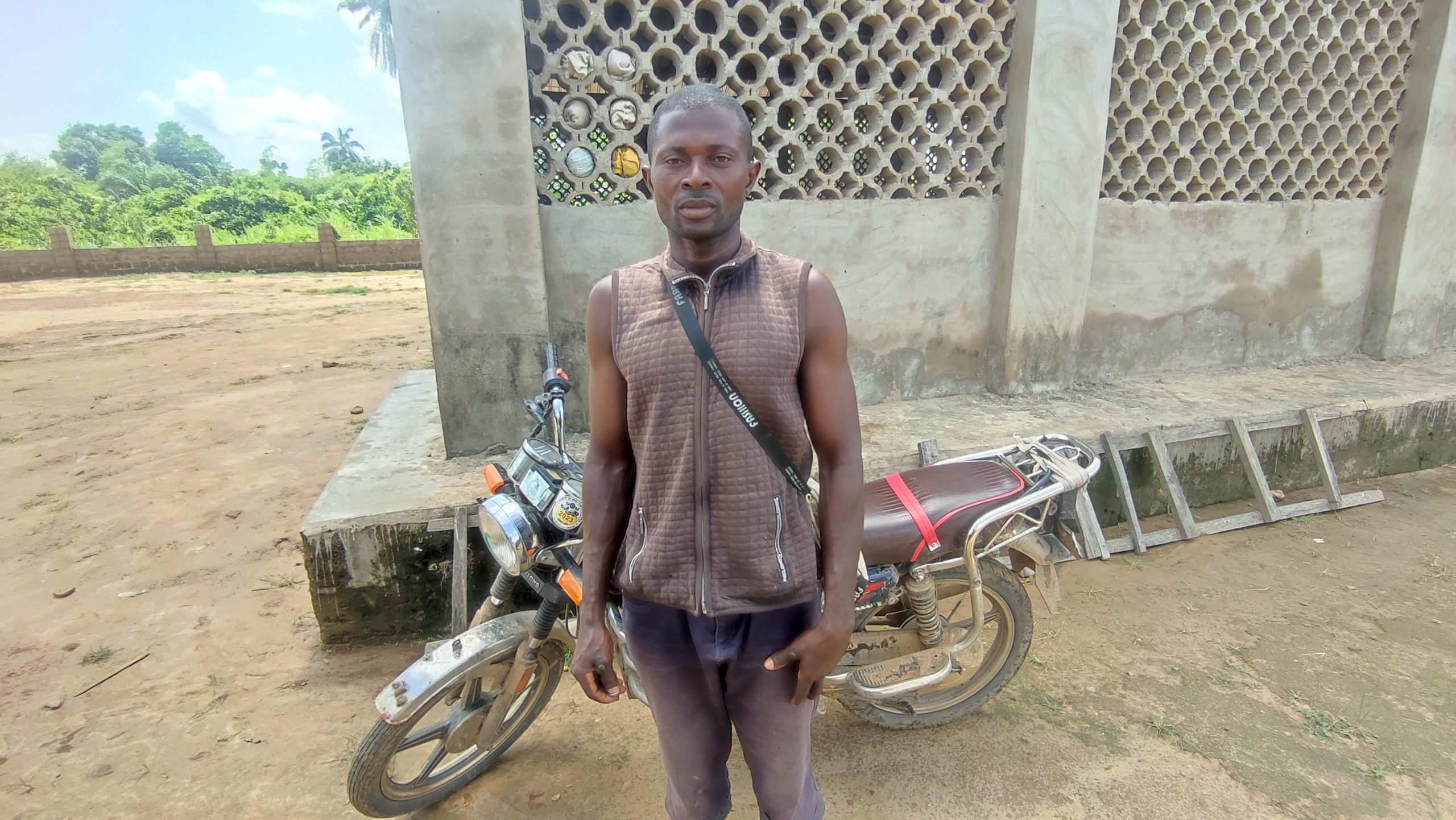
Iko Sunday escaped to the mountains with his family
While most parts of his Onyedega remained submerged, Sunday always came in with a Canoe to borrow money and buy food which he took back to the mountain. The flood also submerged his house and most of his property-cloths and household items were gone. Only a few houses were spared.
A source in the community said that at least six persons died following the flooding.
Sunday’s family is only one out of hundreds of households whose livelihoods were destroyed, following the massive flooding in Ibaji, a littoral local government area in Kogi state, located along the banks of the rivers Niger and Benue, and their tributaries. Till now, several houses across the communities still lay in ruins. Schools and other public buildings were destroyed.
Communities at the mercy of floods
At the start of each harvest season, the rivers overflow their banks, flooding farmlands and houses in Ibaji. Farmers are put in a precarious situation where they have to begin premature harvest while seeking food and emergency shelters for their families.
Bordered to the east by Enugu and Anambra states and to the South by Edo state, Ibaji- the southernmost part of Kogi is made up of over 100 communities, with more than 90 per cent of the population predominantly farmers.
Usually, the farming communities are cut off from other parts of the state because the floods destroy the major roads leading to the area. This makes the movement of people and farm products hectic and sometimes, nearly impossible, with no intervention from the government.
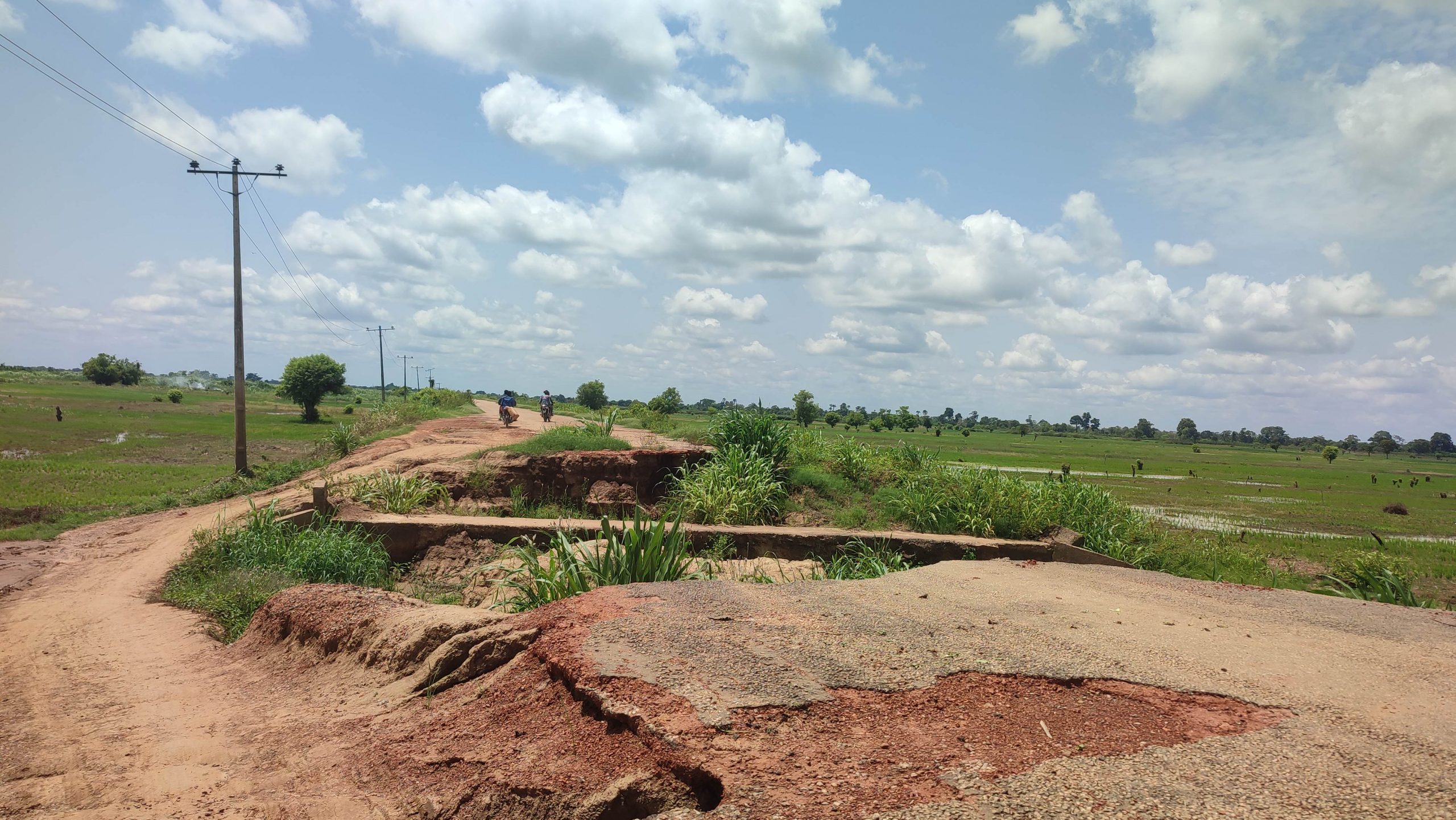
Road destroyed by flooding
The International Organization for Migration (IOM) estimates that at least 19,439 persons across 3504 households were affected by the floods while 13,636 were displaced across eight local governments. Climate variability and the release of excess water from the Lagdo Dam in northern Cameroon are said to have worsened the flood situation, resulting in widespread displacements across the country.
The National Emergency Management Agency (NEMA) estimates that 662 people lost their lives while over 2 million people were displaced across 34 of the 36 states in the country.
When the flood reduced in November and he returned home, Sunday borrowed N100,000 and used it to plant Beans. He said he has harvested some of it and that is what his family has been surviving on.
Before the flood, Sunday was a commercial motorcyclist. Now, he has resumed work but with the only access road to his community damaged, residents prefer to trek long distances to their farms than pay for a ride. He said he had fallen severely while trying to navigate the bad sections of the road.
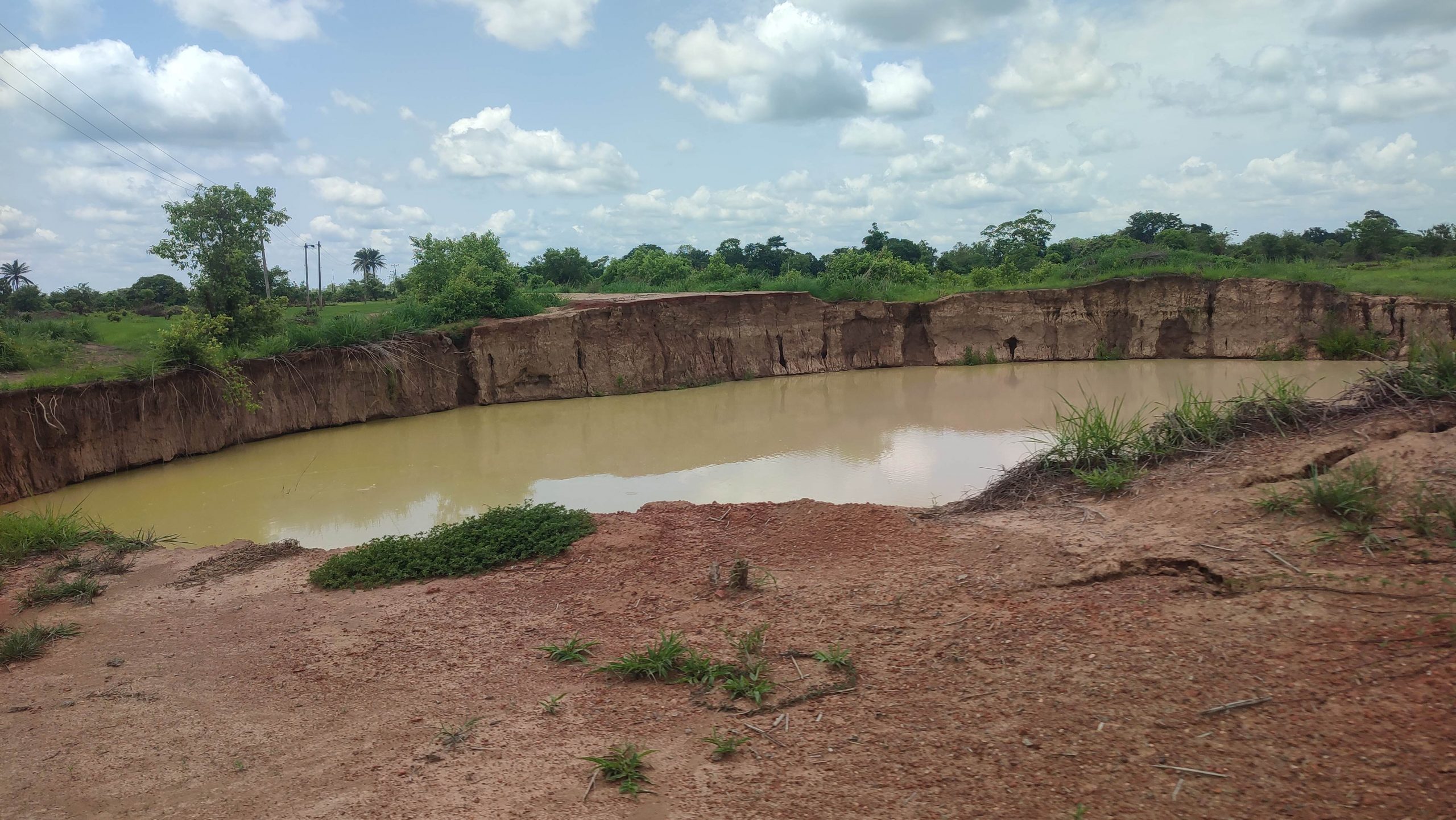
Another road completely cut off by flooding
Most parts of the over 10 km road leading to Onyedega, Iyano and Echeno, three of the communities that make up Ibaji LGA have been chopped off, making it difficult for cars to ply on them. Ibaji has muddy soil that retains water.
It is common to see motorcycle riders navigating through the bushes to find their way into the communities. Onyedega is the headquarters of Ibaji.
“Even the price of transport has gone up because of the bad road and the people are finding it difficult to pay, “he said. “It used to be N1500 to Idah, the closest LG to Ibaji, now, it is N2500,”.
A resilient people, trading by barter to survive
As the flood persisted, most residents of Onyedega switched over to fishing with their Canoes which they often took to Elushi, a local market in Edo State for trade by barter as a means of survival. They were exchanging Fish for Rice, Beans and other food items.
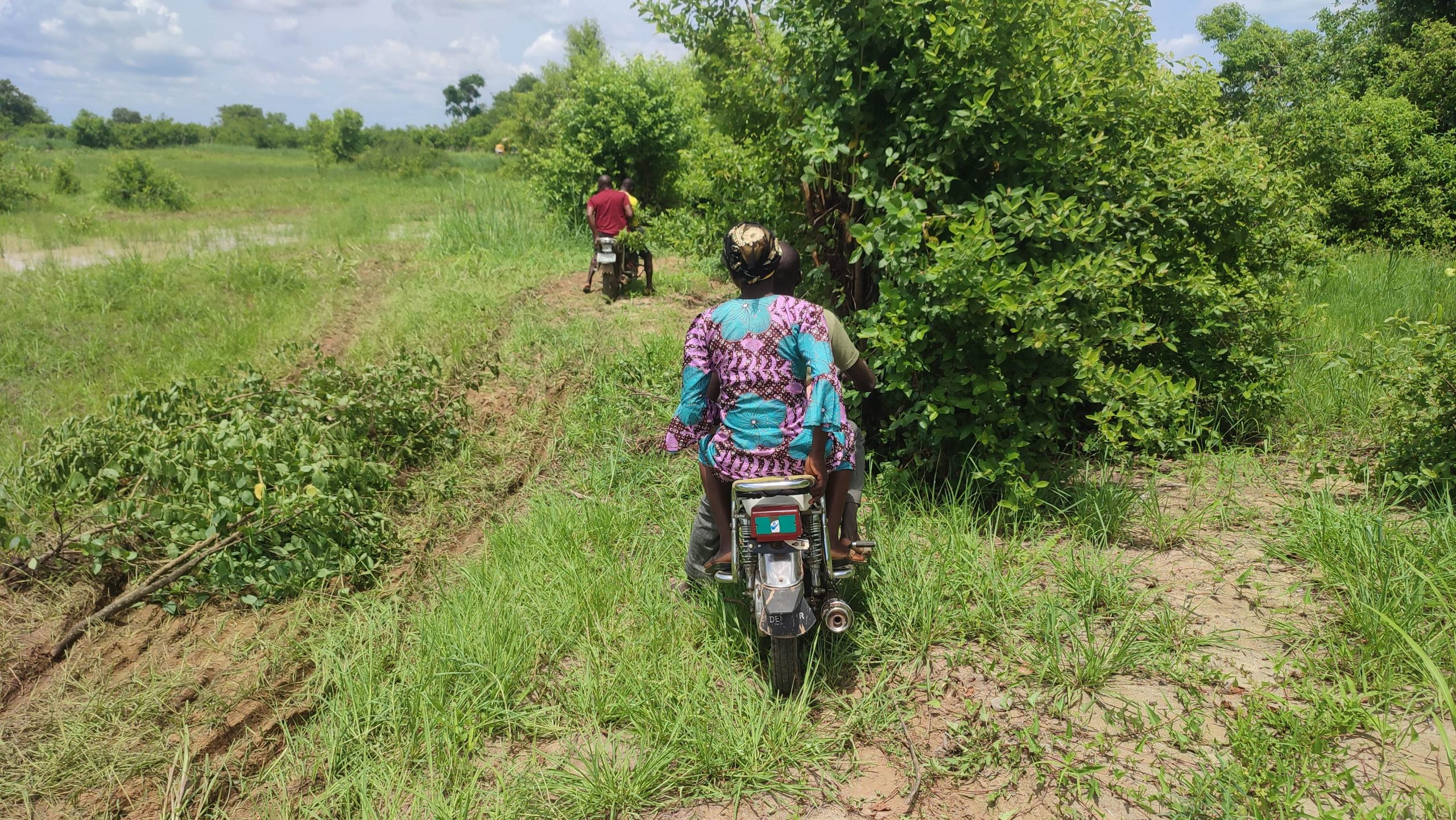
Motorcyclists trying to navigate through the bushes
While some residents escaped to communities in Idah, another local government, others stayed back and made rafters of three fits at the beginning of the flood which they increased as the flood rose.
“On top of the rafter, they prepared a place where they poured sand, put mud so that as it increased, they had a place to prepare their meals and put their bed,” Traditional Ruler of Ibaji, John Egwemi recalled.
He said that some people borrowed money on interest to be able to return the farm. Some collected 1 bag of Rice and promised to pay back with three at the end of the planting season.
Four hectares of farmland destroyed
As soon as Benjamin Offor heard his fence fall around 2 a.m. in September 2022, he and his family- his wife and seven children- started packing their property into a Catholic church where they stayed till November.
Standing in front of his new farm, Offor told this reporter that he could not harvest a single tuber of Yam out of the 800 he planted and five measures of groundnut. His Cassava farm planted across four hectares of land- was destroyed too. As a result, it became difficult for his family to feed.
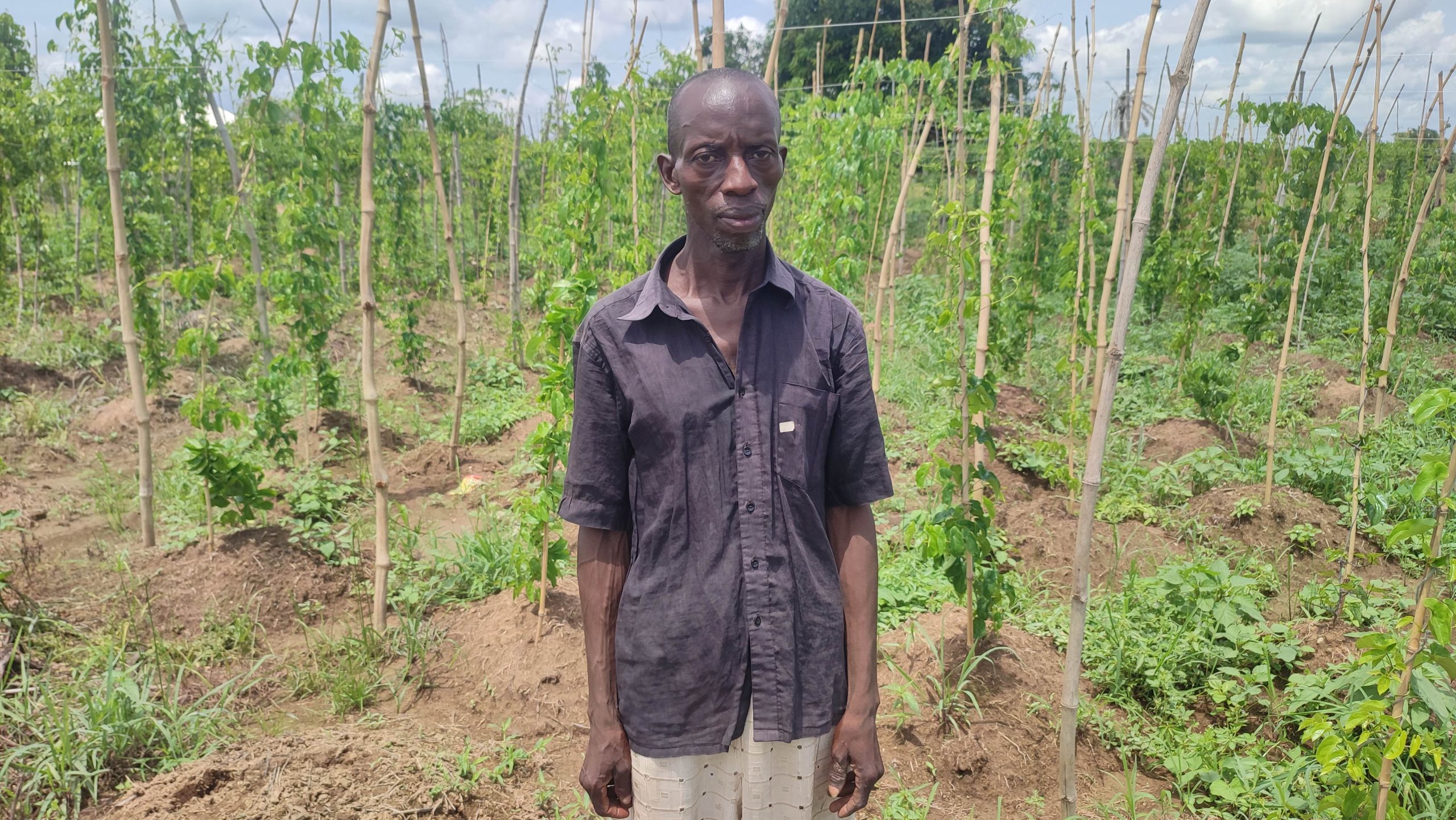
Benjamin Offor lost four hectares of farmland to the flooding
“Oftentimes, my wife borrowed to buy Cassava Flakes (Garri) and Fish which she sold in our local market, whatever profit she made was what we used to eat, “he said. Sometimes, we went days without food,”.
To be able to plant this year, Offor borrowed money from people he will pay back with interest after he has harvested his crops. He regrets that during the flooding period, the government did not help the community.
“I hope that the flood will not come again so that I can harvest and pay back my loan and cater for his family,”. I am also monitoring to see when my Rice farm and yam tubers and other crops will be ready because we are harvesting earlier than normal in case the floods come again,”.
Govt lacks commitment to deal with flooding
The Kogi State government has severally said it is committed to dealing with the flooding challenge in the state. However, a review of its budget performance over the years shows a lack of seriousness on the part of the government.
For instance, the budget performance report for Q1 2023 showed that out of N101m budgeted for erosion and flood control, N36.9m budgeted for post-flood housing estates and social amenities and N53.8m for procurement of emergency tender for flood-related disasters, no money has been released, according to a Dataphyte report.
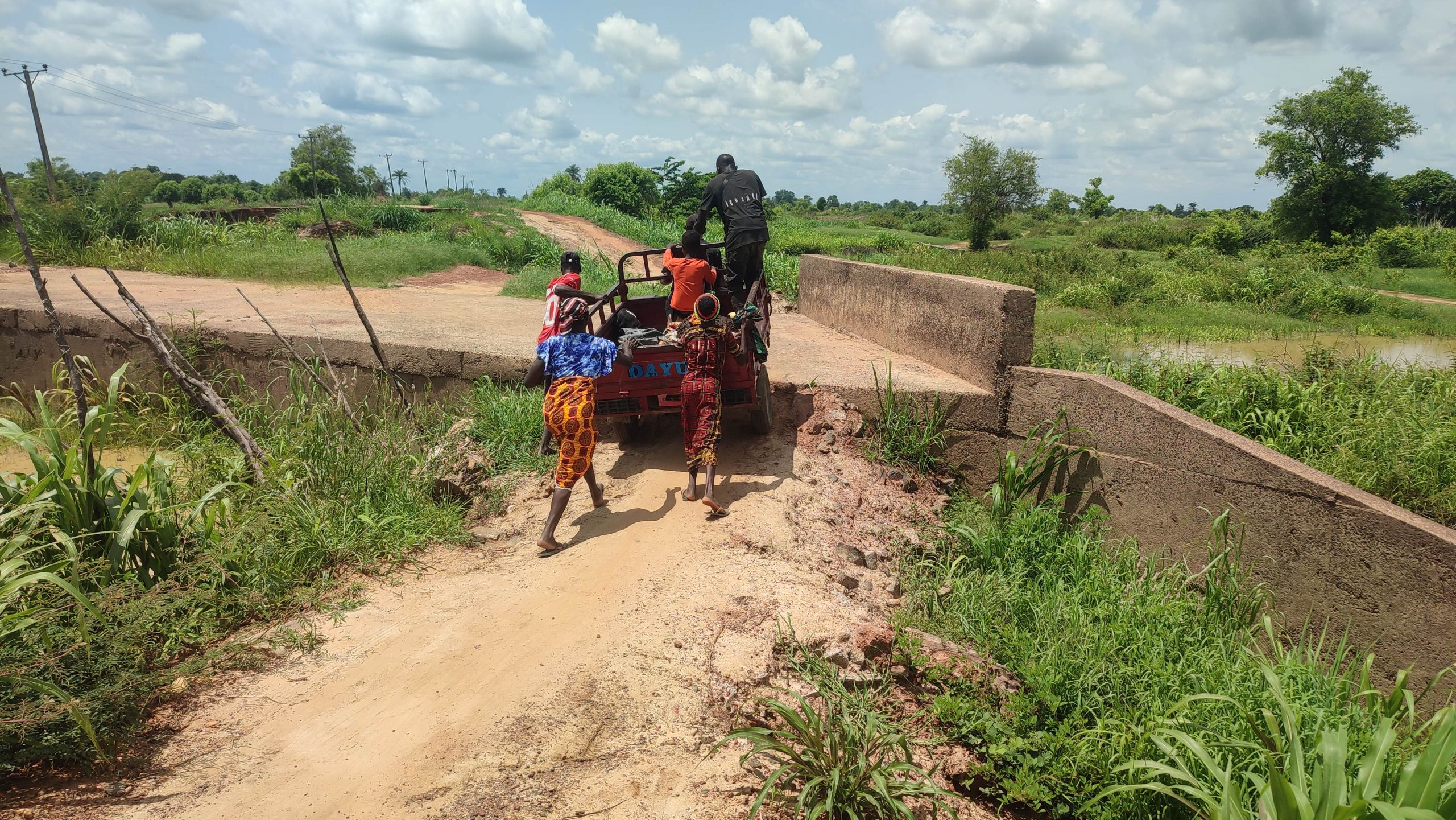
Farmers try to push their Tricycle through the road
In 2021, N105.480 was budgeted for the same purpose but only N26.908 million was spent, according to the state’s budget performance report. In 2022, the state government budgeted N106.3 million for flood and erosion control But only N4 million was spent.
What is most worrying is that the state has also failed to utilise its share of the ecological fund. Between 2021 and 2022, the state received a total of N1.3 billion from the fund- N634.67 million and N667.38 million respectively. However, it only spent N30 million on flood and erosion control. In 2023, another 134.1 million was given to the state.
Dredging of River Niger, way out
Egwemi said that over the years, the government’s flood intervention often comes too little too late and only after NGOs have stepped in to provide succour for the people. He said that the people of Ibaji are the real victims of the flood in Kogi state.
“But what you mostly see in the media are reports from Lokoja, we have been largely neglected by the government, “he regretted. “The first point of call should be to provide boats that will convey the people to highlands after which they settle them in camps and supply relief materials for them,” but you don’t find the government doing this, instead, they bring flat matrasses and food items that are hardly enough for the people,”.
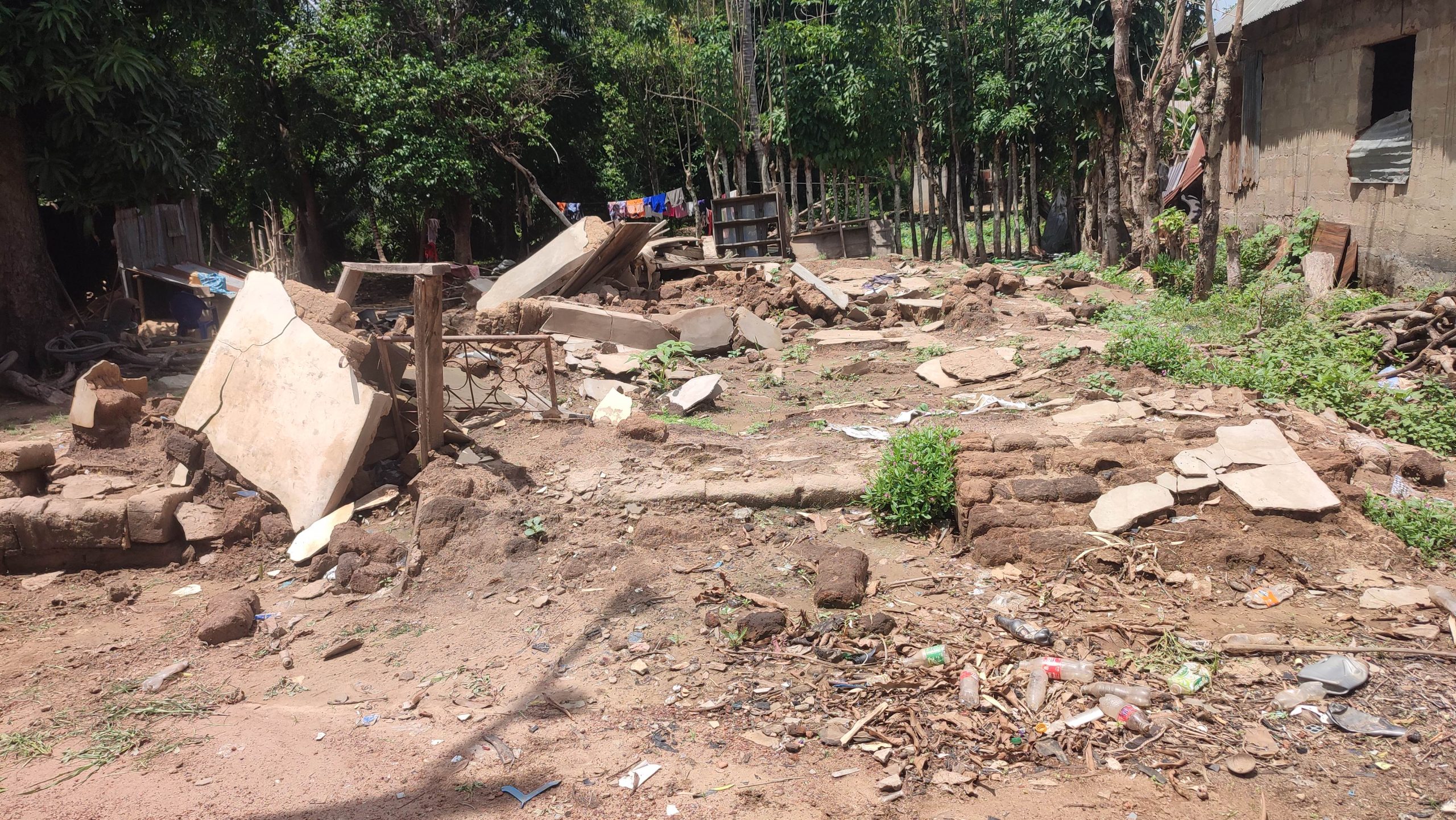
House completely raised by flooding
He explained that Ibaji has never had to wait for the government’s intervention during flooding because they do not care about the welfare of the people and always associate their delays with bureaucratic bottlenecks.
According to him, while the government often claims that it is providing aid to those affected with huge funding from donor agencies, the money hardly gets to these victims.
“Not even one boat was sent by the state government to rescue residents, “he claimed. “Many lives would have been lost during the 2022 flooding had the church not intervened and accommodated everyone, regardless of religion,”.
The traditional ruler also said that he had severally written to the Federal government to properly dredge the River Niger and make it deeper and more difficult for water to overflow and get into communities.
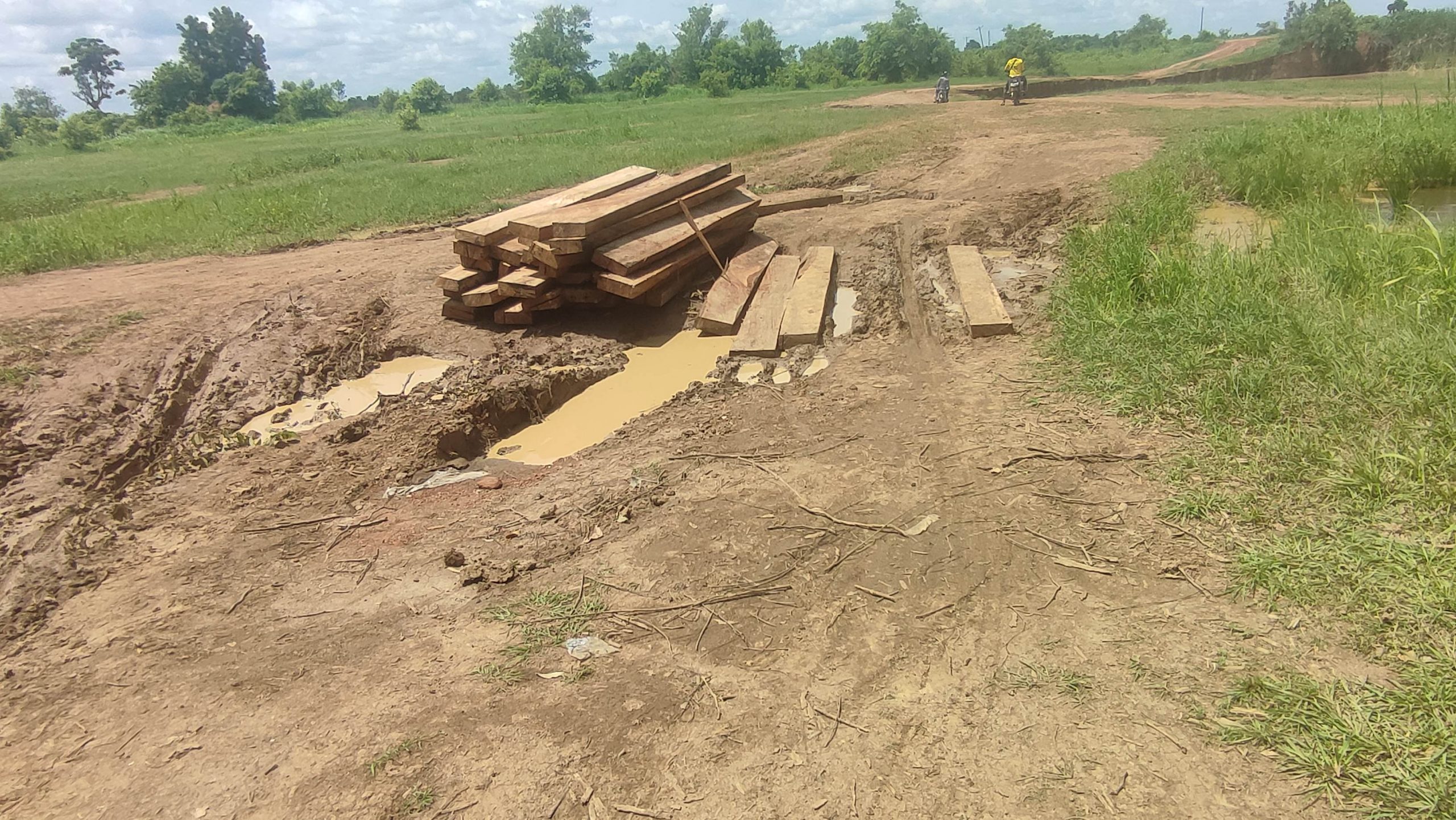
Community members try to construct roads with woods
“It is beyond just throwing sands by the banks of the river because when it rains, it will wash them into the river again, “he said. “After Cameroon built their years ago, they told our government to build one so that when they release water, it will flow into our own dam and gradually released downstream,”.
The traditional ruler said that failing to construct a dam to take in water from Cameroon shows that the government is insensitive to the plight of the people, adding that when constructed, the water from the dam can be released gradually during the dry season for irrigation farming and when the rivers begin to dry for people to travel.
Egwemi has also proposed to the government to build houses on the few highlands in Ibaji so that people don’t have to relocate to Idah or Edo State due to flooding.
Flood risk expert, Taiwo Ogunwumi said that a lot also remains to be done in the aspect of capacity building on the flood preparedness process and quick response for state emergency management staff.
“We must also transition to the use of renewable energy and drastically minimise the emission of fossil which also contribute to the changing climate especially increasing rainfall, “he said.
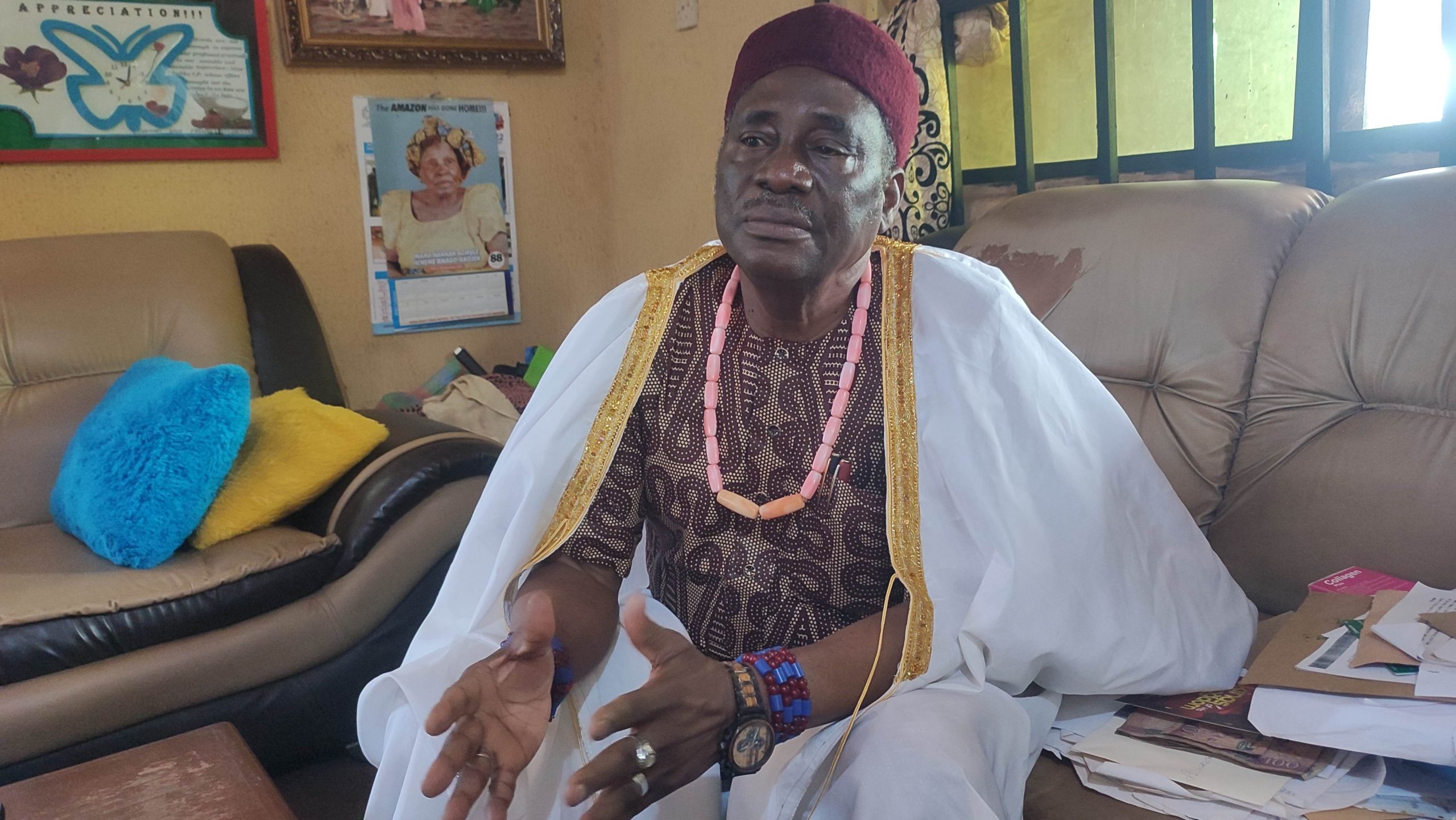
John Egwemi says dredging of River Niger remains only solution
In Onyedega, some farmers are yet to recover from the losses of last year’s flooding. But the Nigerian Meteorological Agency (NIMET) and the National Emergency Management Agency (NEMA) have already warned that the floods might be more devastating this year. Residents in flood-prone areas in Kogi state have also been asked to relocate as the Lagdo dam is gradually being released.
“Many of them are harvesting their crops early enough to avoid losing them to flooding, said Fr. Leo Idama who resumed In September, exactly when the floods came. He had to escape to the Minor Seminary in Idah where he stayed through November because the floods entered his parish house.
“I had packed my property inside the church which was spared and used the speed boat to escape, “he recalled. Since then, I have not driven my car out of the community because the roads are bad,”.
